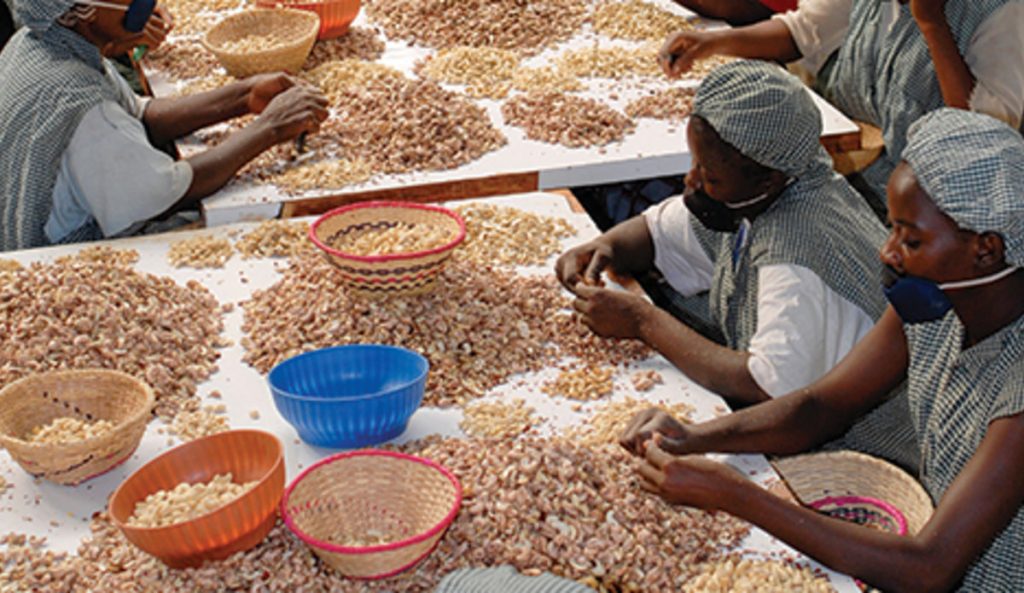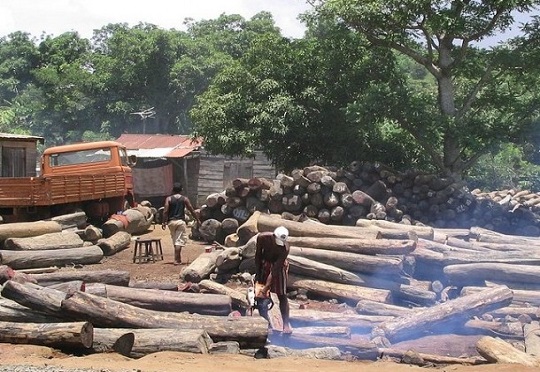You can hear the charming of birds and the hissing of crickets deep in this forest in Gabu. But one sound trembles above all others, and it’s belatedly become more common this year.
It’s no surprise to hear the sounds of machines ploughing down trees in Guinea Bissau’s forested lands. The Portuguese-speaking country has a large forest cover and most of its population live in rural areas. Like in all Sub Saharan Africa countries they primarily use charcoal to meet their energy needs.
In 2015, the government introduced a moratorium on cutting timber to protect a fast diminishing forest cover. But that never stopped as today workers can still be seen throwing rosewood, a high quality timber prized in China into trucks ready to be transported to Bissau, the capital, for shipment to the world’s second largest economy.
Environmental activist Danilo Semedo isn’t at all surprised by an illegal activity continuing with silent approval from government officials. “The companies doing the logging pay kickbacks that’s why they can do it in public. It’s sad some government officials are pushing to lift the logging ban meaning they condone it,” he argues.
Campaigns from Semedo and other activists in the country have made the President Umaro Sissoco Embalo rethink ascending his signature on a draft decree aimed at lifting the moratorium on logging. They fear that soon he will.
Forestry agent Malam Djassi was posted to Djendo in 2019 — the first government official anyone here can remember assigned specifically to monitor logging. Recalling the period between 2012 and 2014, when illegal logging threatened to wipe out the country’s stock of rosewood trees entirely, he says he hopes the moratorium will not be lifted.
“High numbers of large trees that existed at that time were almost wiped out,” he says.
For Guinea Bissau, timber is a huge export that is crucial in helping its struggling economy stay awake. Particularly now during the pandemic.
Guinea Bissau has suffered immensely with the country experiencing chronic food shortages, economic pressure and reduced livelihood opportunities.
The COVID-19 pandemic has highlighted the weaknesses of the health system in the West African nation. For the most part, health infrastructure is obsolete and poorly equipped, while an estimated 60% of the population does not have access to a health facility within 5km. The West African country has one of the worst maternal and infant mortality rates in the world.
The health crisis is expected to compound joblessness, which stands at 11.6% and especially affects the youth.
Before the COVID-19 pandemic, Guinea-Bissau’s economy was expected to grow at a sustained rate of 5% in 2020, but this has been revised downwards. The sharp drop in cashew nut exports is likely to lead to a decline in tax revenues and a deterioration in the country’s fiscal deficit, which is expected to rise from 3.1% of GDP before the pandemic in 2020 to a range of 4.5-4.8% of GDP.

Just last week, the Board of Directors of the African Development Fund approved a $9.8 million grant to Guinea Bissau for its national Control Support Project (PALPC), aimed at reducing the spread of the COVID-19 virus and boosting the resilience of health system and communities, especially the most vulnerable.
To counter an economic slump in cash reserves, Guinea Bissau’s government seems to have turned a blind eye on the illegal logging with timber exports rising from 61 tons in 2007 to nearly 200,000 tons in 2020. All the exports land in China, the country’s major export destination.
“We think the state should extend the moratorium more so that the smallest trees grow and then open” to timber sales again, Djassi says.
It takes 45 to 50 years for a rosewood tree to grow to maturity.
Guinea-Bissau had a 2019 Forest Landscape Integrity Index meanscore of 5.7/10, ranking it 97th globally out of 172 countries, but it is difficult to ascertain those statistics since the government never publishes them.
Semedo says logging should resume only after a census of the country’s forest stocks have been completed and there are adequate mechanisms in place to oversee restrictions that are outlined with the 2015 decree.
“We don’t know how much wood we have, what is the capacity, the conditions of the forest, and what is the level of exploration that is sustainable? There are a lot of things we have to do before this decree is put into action.”
Top government officials have also been caught up in the illegal trade with the current Prime Minister Nuno Gomes Nabiam one of those cabinet officials accused by the Judicial Police of complicity in the trade.
Forest officials like Djassi are the only human block that stands in the way of high ranking officials cutting down Guinea Bissau’s trees for profits. He works in plain clothes, a ripped baseball cap, navy blue slacks and a t-shirt. His phone is an ancient Nokia, which is great for durability, but ineffective if he wants to take pictures documenting abuses, or communicate via whatsapp.
Djassi has come across loggers cutting wood illegally and had no choice but walk away without confronting them. He lacks arms, or support in man power to make operations.
“We usually control the bush on foot, looking out for an 8-kilometer area. We still need more government support when it comes to training in the environmental field,” he says.

There is support for resuming logging in Gabu. Talibo Coté, a local administrator, says he wants the moratorium to be lifted, partially for the same reason Djassi wants it to remain in place: logging has continued despite the ban. Coté says that if the ban is lifted they can better regulate the cutting, jobs will be created, and the community can benefit economically from responsible logging. Local firms may get the chance to carry out the logging, now done by the Chinese businessmen.
He echoes points made by the country’s minister of the environment, Viriato Cassama, who says the moratorium was mostly cosmetic. “From a political point of view {the ban} had an impact but from a practical point of view it did not have an impact. It is like drugs. It is prohibited but it continues to be used,” he says.
Cassama says that by lifting the ban while enacting strict regulations, such as requirements to replant after cutting, authorities can improve their management of the forests.
One notorious example of continued cutting during the moratorium took place in 2018, when the country sold off a stockpile of logs that had been sitting idle since the ban three years earlier. The sale was approved by authorities in need of money due to pressure by the International Monetary Fund to reimburse a defaulted loan. The World Bank encouraged the sale.
Guinea Bissau is facing one of its worst years economically since the end of the post-independence war period in the early 2000s. Saving the forests and ending the sale of a product found in plenty but quickly diminishing may be a step too far for goverment authorities.

